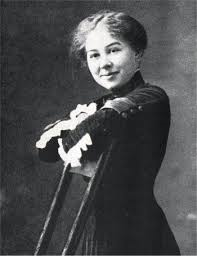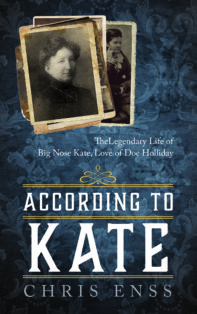According to Kate is coming soon to bookstores everywhere.
In honor of her imminent arrival this month is dedicated to
Wild Women like Kate Elder.

Rosa May sat beside the bed of a dying miner and wiped the sweat off his feverish brow. She looked around his rustic, one-room cabin, past the sparse furnishings, and fixed her eyes on a tattered photograph of an elderly man and woman. “Those are my folks,” the man weakly told her. “They’re in Marshall County, Illinois. Where are your folks?”
The question stunned Rosa. No one ever asked about such things. No one ever asked her much at all. Conversation wasn’t what men were looking for when they did business with her. Rosa glanced out the window at a couple of respectable, well-dressed women. They watched her through the clouded glass, pointed, and whispered. She knew what they were saying without hearing it. Rosa was just one of a handful of “sporting women” living in Bodie, California, in 1900 and she knew what people thought of her. It used to bother her years ago, but not now. It was an occupational hazard she’d learned to live with.
“Don’t you have people anywhere?” the miner asked. Rosa dabbed the man’s head with a cloth and smiled. “I don’t know anymore,” she answered. “If I did have, they’d be back in Pennsylvania.” Rosa’s parents were Irish – hard, strict people. Rosa had dreamed of the day she would be out of their puritanical household. She had left home in 1871, at the age of sixteen and soon found there weren’t many opportunities for a poor, petite, uneducated girl with brown eyes and dark, curly hair. She ended up in New York, hungry, homeless, and eager to take any job offered. The job offered was prostitution and five years later she came west with other women of her trade, hoping to make a fortune off the gold and silver miners.
Prostitution was the single largest occupation for women in the West. Rosa hoped to secure a position at a posh brothel with crystal chandeliers, velvet curtains, and flowing champagne. The madams who ran such places were good to their girls. They paid them a regular salary, taught them about makeup, manners, and how to dress, and they only had to entertain a few men a night. If a high-class brothel wasn’t available, Rosa could take a job in a second-class house and work for a percentage of the profits, turning as many tricks as she could each night. If all failed, she could be a street walker or rent a “crib” at a boardinghouse. Cribs, tiny, windowless chambers, had oilcloths draped across the foot of the bed for customers in too big of a hurry to take off their boots.
Rosa May arrived in Virginia City, Nevada, in 1875 and went to work for a madam known as Cad Thompson. Cad was a widow who ran several parlor houses in town, including a three-story, brick structure called the “Brick House.” Cad and Rosa became fast friends, confiding in one another and talking about meeting their Prince Charming. “Whores dream of falling in love, too,” Cad frequently told Rosa.

To learn the rest of Rosa May’s story read
Wicked Women:
Notorious, Mischievous, and Wayward Ladies from the Old West

